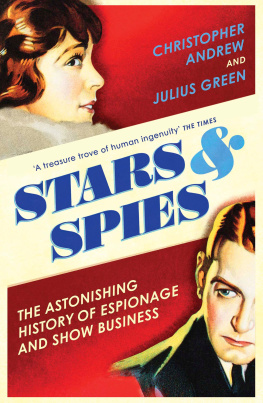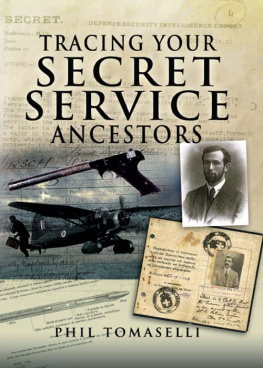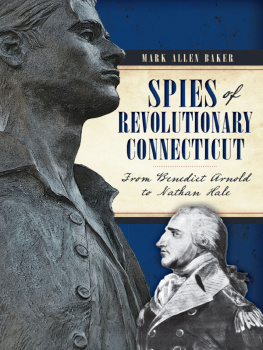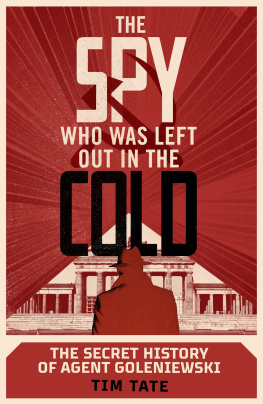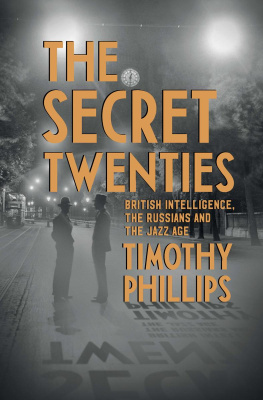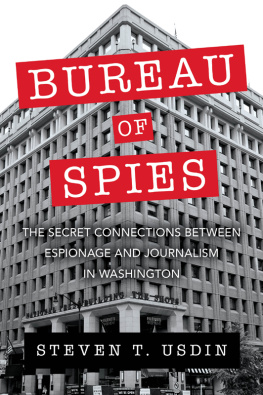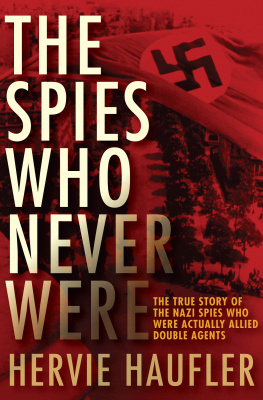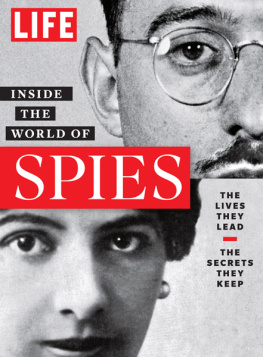A HUNDRED YEARS OF
SPYING
PHIL CARRADICE
First published in Great Britain in 2021 by
PEN AND SWORD HISTORY
An imprint of
Pen & Sword Books Ltd
Yorkshire Philadelphia
Copyright Phil Carradice, 2021
ISBN 978 1 52678 141 3
ePUB ISBN 978 1 52678 142 0
Mobi ISBN 978 1 52678 143 7
The right of Phil Carradice to be identified as Author of this work has been asserted by him in accordance with the Copyright, Designs and Patents Act 1988.
A CIP catalogue record for this book is available from the British Library.
All rights reserved. No part of this book may be reproduced or transmitted in any form or by any means, electronic or mechanical including photocopying, recording or by any information storage and retrieval system, without permission from the Publisher in writing.
Pen & Sword Books Limited incorporates the imprints of Atlas, Archaeology, Aviation, Discovery, Family History, Fiction, History, Maritime, Military, Military Classics, Politics, Select, Transport, True Crime, Air World, Frontline Publishing, Leo Cooper, Remember When, Seaforth Publishing, The Praetorian Press, Wharncliffe Local History, Wharncliffe Transport, Wharncliffe True Crime and White Owl.
For a complete list of Pen & Sword titles please contact
PEN & SWORD BOOKS LIMITED
47 Church Street, Barnsley, South Yorkshire, S70 2AS, England
E-mail:
Website: www.pen-and-sword.co.uk
Or
PEN AND SWORD BOOKS
1950 Lawrence Rd, Havertown, PA 19083, USA
E-mail:
Website: www.penandswordbooks.com
Chapter One The Second Oldest Profession
Chapter Two Spy Fiction and Spy Fact
Chapter Three An Advance into War
Chapter Four Conflict Comes at Last
Chapter Five Host of Spies-the Interwar Years
Chapter Six A Gathering Storm
Chapter Seven War!
Chapter Eight A Cold, Cold Comfort
Chapter Nine The Yanks are Coming
Chapter Ten Colder Yet and Colder
Chapter Eleven A Continuing Fascination
Chapter Twelve An End of Spying?
Notes
Bibliography
Introduction
To most of us the world of spying is one of mystery and suspense, romantic places, dangerous villains and noble heroes. Nothing could be further from the truth. In reality it is usually hard to differentiate between heroes and villains. Indeed, in many cases they are exactly the same people, spying for both sides at the same time. That is what makes the spys world so fascinating if not totally wholesome.
It would be foolish to state that this book can examine every aspect of spying during the 100 years it covers. It would need a volume five, ten, twenty times the size of this one to relate every mood and moment of spying and then, because of the nature of the subject, it would still miss so much. So this is not a definitive survey; its a sample, a toe in the water, a look at the more interesting spies and their adventures during one of the most fascinating centuries of world history.
The book concentrates on the careers of spies themselves rather than the political machinations that sent them off to glory or death. After all, without the spies there would be no spying. Many spies are mentioned here, many more are not. Readers may lament the exclusion of this agent or that one, but ultimately it comes down to shortage of space and personal preference. I make no apologies for concentrating largely on the British espionage services, which was where my interest began. But the nature of the spy game demands more. Spies cannot exist in a vacuum, that would defeat the very object of spying, and so the book also contains stories of German, Russian, French and American agents and their relationships with their British colleagues or opponents.
Enough prevarication: this is not the place for long introductions saying what the book is or is not about. Hopefully that will become clear as you read. As the bard did NOT say, Read on, MacDuff, and damned be him who first cries Hold, enough.
Phil Carradice, St Athan, 2020
Chapter One
The Second Oldest Profession
Some become spies for money, or out of veracity, or megalomania, or out of ambition, or out of a desire for thrills. The malady of our time is those who become spies out of idealism.
Max Lerner
There have always been spies, people who watch, clandestinely or openly, the activities of other people and then report back to yet more people. The word people is deliberately over-used in this opening paragraph.
Spying has always been bound up with the lives of people, what they do and why they do it. Spies are individuals who have appeared briefly in our consciousness, sometimes under the radar, sometimes in the full glare of publicity. They are people who have sometimes left their mark on our history and sometimes fallen into well-deserved ignominy.
The art of spying has been glibly and probably accurately termed the second oldest profession in the world. It has certainly been around for a long, long time. And yet there are those who advise forgetting the appellation second. Spying, they say, is actually the first and oldest profession. If so, it is not quite clear where such an acknowledgement leaves large portions of society: the ladies of the Turkish harems, the camp followers of all invading armies since the beginning of time, and the women from the back alleyways of villages, towns and cities across the world.
One thing is clear. Since man first began to covet the land and possessions of others, spies have been used to supply information for the benefit of attacking or defending armies. For governments and politicians spies have helped to inform policy, assist with strategy and, through the validity or ineptitude of their information, helped devise tactics.
Spies have made political and military careers for their associates and then destroyed them with little more than a nod of the head. If envy is an innately human emotion then it is easy to see why the spy, as an entity, has been appreciated by some and yet soundly reviled by others.
The Book of Numbers in The Old Testament tells us that after the flight from Egypt the patriarch Moses despatched twelve spies into Canaan, one from each of the twelve tribes of Israel. Their job was to reconnoitre the lie of the land, assess the potential opposition and to analyse the ease with which the country might be conquered.
Unfortunately for Moses, the spies employed in the mission were amateurs, scouts rather than secret agents. Apart from two men, Joshua and Caleb both ferocious, hard-bitten warriors the spies were terrified of the regions fortified cities and the giants who supposedly ruled the lands.
They returned with negative reports. As a result Moses turned his eyes away from Canaan and the Israelites were forced to wander in the desert for the next forty years. It was a classic case of a leader listening to the wrong advice. The amateurs got it wrong and while Joshua and Caleb might fume and fret there was nothing they could do in the face of Mosess decision.
The Mogul rulers of India understood the power of insider information far better than Moses. They ruled their vast territories on the Indian sub-continent by a combination of wise judgement and harsh military force. As a result they employed dozens of agents or spies. The Emperor Akbar apparently had over 4000 of them, all employed to scout, observe and report back, telling him exactly what his enemies were doing.








